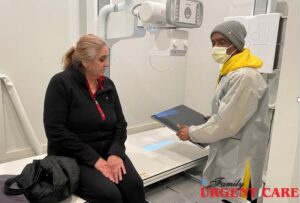Over 8 million doctor’s visits each year are to treat the symptoms of a UTI, or urinary tract infection. This common condition causes pain and discomfort in a sensitive area of the body, and complications can lead to severe consequences for your kidneys.
Asrar Sheikh, MD, and Teofilo Vinluan, MD lead the medical professionals at Family Urgent Care, providing a variety of primary care services to anyone who resides in or around Chicago. A UTI has distinctive symptoms, but not everyone will realize they have a UTI until they see their provider for testing.
What to know about UTIs
The urinary tract isn’t limited to the body parts that may immediately come to mind. Your urinary tract starts at your kidneys, which filter wastewater from your system. The waste flows through vessels called ureters into your bladder, where it is expelled through the urethra. An infection anywhere on the wastewater’s path out of the body constitutes a urinary tract infection.
According to the Centers for Disease Control and Prevention, a urinary tract infection occurs when bacteria enter the urethra. The trapped bacteria causes the urinary tract to become inflamed. Typical symptoms of a UTI include:
- Frequent urges to urinate
- Strong or foul-smelling urine
- Bloody or painful urine
- Pain in your pelvic area, sides, or abdomen
- Incontinence
- Penis pain
- Fatigue
- Fever
- Vomiting
UTIs can also cause pain during sex and may be mistaken for a sexually transmitted infection. Women are at elevated risk of developing UTIs, in part because the female urethra is short, relative to the male urethra, and located more closely to the anus, a well for bacteria.
Though women are most likely to develop a UTI, any person can experience a UTI. Other risk factors for UTIs include:
- Pregnancy
- Menopause
- Sexual activity
- Poor hygiene
- Use of spermicide
- Age
- Previous urinary tract issues
- Previous UTI
Having risk factors for a UTI doesn’t guarantee that you will experience a UTI, but having risk factors is enough for you to consult your provider at Family Urgent Care, who can provide you with guidance and preventative measures to stop a UTI before it happens.
Understanding the 3 types of UTIs
If you’re exhibiting any symptoms of a UTI, it’s important to contact your provider at Family Urgent Care as soon as possible. The only way to confirm what could be wrong with you is through testing. The three types of UTIs include:
Cystitis
The majority of UTIs are cystitis, making it the most common type of UTI. Cystitis is an infection of the bladder, with E. Coli as the chief cause. Cystitis manifests in painful, bloody urine and pelvic pressure.
Urethritis
Urethritis, as the name insinuates, is an infection of the urethra. The most common symptoms include discharge and painful, burning urination.
Pyelonephritis
This kidney infection is usually the result of an infection of the bladder or the urethra left untreated. Back pain, nausea, chills, and fever can indicate this condition, but further procrastinating treatment puts you at risk for permanent kidney damage, or sepsis, the point where the infection enters your bloodstream.
What to do if you have a UTI
If you’re experiencing any of the symptoms mentioned, your first priority is to contact your provider at Family Urgent Care for an appointment. Testing is best done with your provider, who can not only identify what type of UTI you have but immediately provide the necessary prescription for what you need to make a full recovery.
Don’t ignore the symptoms of any condition. Call any of our offices, or book online with us today.
























